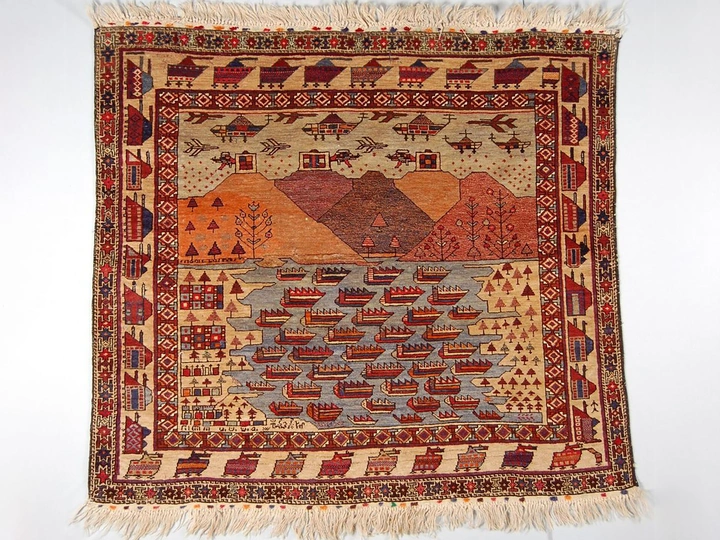SHIRIN Institute: a cooperative of hand-woven rugs

(b. 1989, Poland) interdisciplinary artist with a background in architecture, lives and works in Athens. Their work is a transdisciplinary research based on processual collective practice. They explore the dynamics between the represented and the repressed, attempting to find collective regenerative systems. Their artistic practice includes film, text, installation and performance. She works in the areas of alternative social economies, as initiator of a project space DOMIE in Poland, a socio-artistic and architectural-economic experiment of collective care dedicated to the LGBTQ+ community and Eastern European diasporas, est. 2018, where more than 400 artists shown their work, based on the practice of commoning against the commodification of space and knowledge.
A graduate of Architecture and Urban Planning at Università degli Studi di Firenze, Poznan University of Technology and Intermedia at the University of Arts in Poznan. Her works were shown at: Manifesta 14 in Pristina, documenta fifteen in Kassel, NADA Villa Warsaw, State of Concept Athens, Victoria Square Project in Athens, ZKM Karlsruhe, MoMA Warsaw, Arsenal City Gallery Poznań, BWA Wrocław, Gdansk City Gallery.
SHIRIN is a cooperative institute of women professional Weavers based in Greece, displaced from Rug Belt countries (MENA and Central Asia), who create hand-woven political rugs. The institute is rooted in both theory and praxis, aiming to challenge the dominant Eurocentric canon and its narratives that undermine collective knowledge and diverse experiences.
SHIRIN emerges to find a collective healing system through an alternative economy that opposes the commodification of space and knowledge and critical consciousness methodologies rooted in mutual survival struggles. Favouring small-scale practice of commoning to catalyze the society to enact and reconsider collective care.
SHIRIN aims to address issues such as resettlement stress and acculturation of Newcomers, which are both challenged by economic support and educational exchange created by enabling work in a primarily chosen field while cultivating dispossessed homeland heritage.
SHIRIN’s community members are expert weavers who reclaim their dignity through decolonial modalities of solidarity as their foundational values aim to challenge and dismantle imperialistic legacies and structures of power by illuminating a paradox hidden within their practice. While ‘Persian’ carpets are the most valued in the world, former weavers are systematically displaced. The material production of the Rug Belt has become cultural heritage in the West while its contemporary weavers have no right to be present. SHIRIN mission is thus to fashion new tools for the purpose of accommodating struggles against various forms of dispossessions towards the creation of new realities. Collaborative (un)learning redefines the notion of capital and hierarchical models of power, while attempting to find a common regenerative spring.